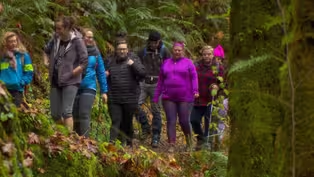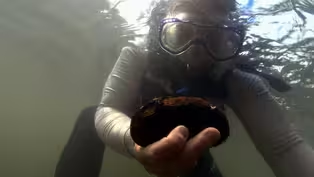Oregon Field Guide
Alpha Farms
Clip: Season 29 Episode 11 | 11m 14sVideo has Closed Captions
A visit to Alpha Farm reveals life on Oregon’s longest-running intentional community.
Meet the residents of one of Oregon's oldest intentional living communities, tucked in the scenic valley of Deadwood, Oregon.
Problems playing video? | Closed Captioning Feedback
Problems playing video? | Closed Captioning Feedback
Oregon Field Guide is a local public television program presented by OPB
Oregon Field Guide
Alpha Farms
Clip: Season 29 Episode 11 | 11m 14sVideo has Closed Captions
Meet the residents of one of Oregon's oldest intentional living communities, tucked in the scenic valley of Deadwood, Oregon.
Problems playing video? | Closed Captioning Feedback
How to Watch Oregon Field Guide
Oregon Field Guide is available to stream on pbs.org and the free PBS App, available on iPhone, Apple TV, Android TV, Android smartphones, Amazon Fire TV, Amazon Fire Tablet, Roku, Samsung Smart TV, and Vizio.
Providing Support for PBS.org
Learn Moreabout PBS online sponsorship(birds chirping) (metal tapping) - [Narrator] On this 280 acre farm, the spring morning starts the same as many mornings.
(door creaking) (chickens cackling) Kathleen feeds the chickens and gathers eggs.
Nathan splits firewood.
(ax thudding) Phil fixes a chain in the tractor shed.
And Natalie tends new spring starts in the greenhouse.
You could say that life here is really not that much different than on any family farm.
But Alpha Farm is not a typical farm.
(pleasant music) It started during the colorful chapter of American history, known for hippies, flower power, painted school buses, when a counterculture generation went back to the land and experimented with communal ways of living.
But while many of the communes of the 60s and 70s failed or faded, Alpha Farm has managed to hang on.
Tucked deep into the coastal mountains of Oregon, life at Alpha Farm is relatively isolated.
And outsiders, a bit of a mystery.
- Alpha Farm is an intentional community.
A group of individuals live here harmoniously.
And it's, I don't know, it's hard to put a label on this place.
- Well, we definitely can't be put inside a box, that's for sure.
- We're Quaker based from a foundation.
We're not Quaker by any means, but we are Quaker based.
And Quakers have a history of a good work ethic.
- I spend most of my days just doing handyman stuff, chopping wood, carrying wood.
(feet padding) I mean, there's always plenty to do.
And, you know, we work until, pretty much until we hear the second dinner bell.
There's a first dinner bell for 20 minutes.
And then there's another dinner bell for, hey, you better get your butt in here.
(bell gonging) - All right.
- [Narrator] Every evening, the residents of Alpha Farm gather.
They start their meal with a moment of silence and kiss each other's hands.
It's a gesture to recognize each other, and to honor that they have chosen to live here.
- And the sauce.
- Bon apatite.
- [Narrator] At the head of the table is 89-year-old Caroline Estes, the original founder of Alpha Farm.
(pleasant music) She's the last of the original Alpha members, and has remained here since its start in 1972.
Around this table, she's welcomed hundreds of people over the years.
I sat with Caroline at the big table to learn about the origins of Alpha Farm.
- Oh, this is way back.
That's my husband, that's Linda.
I think that's Meadow.
That's Judy.
Probably this is a group of people who really epitomized the strength of how we got going and kept us going.
- It seems like there's a lot of idealism and optimism in this group here.
- There was.
We knew what we were doing and why we were doing it.
- [Narrator] Caroline never considered herself a hippie.
But like so many others at the time, she felt a disconnect and dissatisfaction with mainstream America.
The segregation, sexism, and war that raged in Vietnam.
She envisioned a simple place where she, Jim, and others, could live out their Quaker values of non-violence, egalitarianism, and hard work.
(birds chirping) With a small group of like-minded individuals, Caroline traded her urban life in Philadelphia for a farm deep in the coastal mountains of Oregon.
It was at the end of a gravel road with forests, hay fields, and a flowing creek.
(water lapping) It was called Alpha.
(birds chirping) (water lapping) They cut wood to heat their homes and planted a garden to grow food, (pleasant music) but they still needed to pay the bills.
So within the first few months, they launched a business to help support the farm.
They called it the Alpha-Bit Cafe.
Some 20 miles away in the nearest town of Mapleton, they converted an old pool hall into a coffee shop with books, handcrafts, and grain burgers.
- [Caroline] We didn't count hours and days.
We had to work maybe 12 hour days, maybe 10 hour days, maybe six days a week, maybe seven days a week.
But that wasn't how we qualified what we were doing.
I think it would be fair to say that all of these people wanted to live a whole life.
And I guess we could say wholesome life, with a view to creating something that was sustainable and long-term.
(truck purring) - [Narrator] Acceptance of the new hippie cafe in the logging town of Mapleton was a slow start.
And it wasn't clear if they were gonna survive the first winter.
(car purring) But the retirement of the local mailman gave them an unexpected opportunity.
(mailbox creaking) (mailbox shutting) (car purring) The mail route has been a dependable source of income and sustained them through lean times.
It also gave them another point of contact with the surrounding community.
- The main reason that they started Alpha-Bit in the first place was outreach into the community.
We are an intentional community, we're not just a community that occurred.
And in that, we have a message.
Our message isn't like so much in words as it is in relationships.
As an example, for Christmas, we make usually cookies or candy treats or fudge or something.
And we deliver that to all of our 240 or so mail patrons.
It hasn't been the same mail car drivers for 42 years, but it's always been Alpha.
(car purring) (knife thudding) - [Narrator] At its height, Alpha was just over 30 people and five at the lowest.
(machine buzzing) This spring, at eight, it's pretty low.
But Nathan and Natalie are new arrivals.
- [Nathan] I always felt like drawn to Alpha Farm.
I had dreams about the bus, I saw the bus in a picture.
And I had this dream that I was living in the bus.
So when I got here, they were like, "You know, you should find a room, you know, if you're gonna stick around."
I was like, "I want the bus."
And that was weird 'cause like nobody wanted the bus.
Nobody had lived there in like I think a year or so.
It needed some love, some fix up stuff.
And so, I don't know, generally, I guess I'm saying is, I'm right where I want to be.
♪ Well the poor wee boy's a little black bug ♪ ♪ He comes from Mexico some folks say ♪ ♪ And come all the way to Texas ♪ ♪ Just looking for a place to stay ♪ ♪ Looking for a home ♪ ♪ Just looking for a home ♪ (rain pattering) (wind howling) - [Narrator] Alpha Farm has weathered lean years and remains.
In fact, it's the longest continuously running intentional community in Oregon.
- Caroline, with the support of scores of other people, particularly Jim, had a vision.
And the legacy is that they had faith in the vision and they walked it out.
(pleasant music) - [Narrator] At least six babies have been born at Alpha.
Several marriages and four deaths, including Caroline's husband, Jim.
(birds chirping) - My daughter got this tree to commemorate, and so he's buried right here.
- [Narrator] Jim's grave is marked by a weeping cherry tree.
- And I expect to be buried next to my husband.
- [Narrator] After 44 years, Alpha Farm closed the doors of the Alpha-Bit Cafe.
It was just too much work for too few people to keep it going.
For months afterwards, loggers and locals stopped by, but found it empty with a thank you note in the window.
And it raised the question, had the heyday of Alpha passed?
Were the farm's years numbered?
- Alpha Farm is going away.
It may not go away when Caroline dies.
It may last another 10 years, let's say 100 years.
Let's give it 1,000, okay?
It's going away.
It doesn't matter, you don't have to keep it going.
The point isn't keeping Alpha Farm going.
The point is when you're going, what you're doing.
(pleasant music) - You know, there's always something new and we're always living the moment to moment.
You know, at this time we may be experiencing, although it's rain but, you know, within this few more moments, we're gonna be in sunshine.
So I think that the will and the power to see through the change.
- Every day, I thank the spirit that brought me here and keeps me here.
And I don't have any feeling of not being here, so I don't think I'm finished yet.
(pleasant music) - [Narrator] So for now, the spring day ends like many good days at Alpha.
Caroline takes her place at the head of the big table.
And this family of intention gather again to share the fruit of their labors.
(family chatting) (pleasant music) (no audio) (no audio)
Freshwater Mussels in the Willamette River
Video has Closed Captions
Clip: S29 Ep11 | 9m 5s | What native freshwater mussels tell us about the health of the Willamette River. (9m 5s)
Providing Support for PBS.org
Learn Moreabout PBS online sponsorshipSupport for PBS provided by:
Oregon Field Guide is a local public television program presented by OPB

















